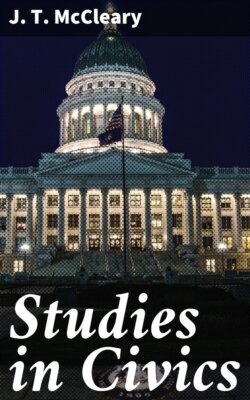Читать книгу Studies in Civics - J. T. McCleary - Страница 28
На сайте Литреса книга снята с продажи.
REMARKS ON CRIMINAL TRIALS.
ОглавлениеThe care for the rights of the accused is based upon the principle in our law, that every man shall be held innocent till proved guilty. Another principle is that a person accused of crime cannot be tried in his absence. The purpose of arresting him is to secure his presence at the trial. If he can guarantee this by bail he is set at liberty, otherwise he is confined in jail. (See p. 231.)
Pertinent Questions.
Are the justices and constables town, county or state officers? How is it known at the county seat who the justices and constables in each town are? Define docket, summons, warrant, pleading, subpoena, crime, felony, misdemeanor, venire, costs, execution, recognizance. Why are there two justices in each town? What is meant by "change of venue?" How is an oath administered in court? What persons may not serve as witnesses? If a criminal should make confession of the crime to his lawyer, could the lawyer be subpoenaed as a witness on the trial? Name some things "exempt from execution" in this state. What is to hinder a bitter enemy of yours, if you have one, from having you committed to prison. Can a civil suit proceed in the absence of the defendant?
Practical Work.
Assume that John Smith bought from Reuben White a cow, the price agreed upon being $30; that Smith refuses to pay, and White sues him. Write up all the papers in the case, make proper entries in the docket, assessing costs, etc.
